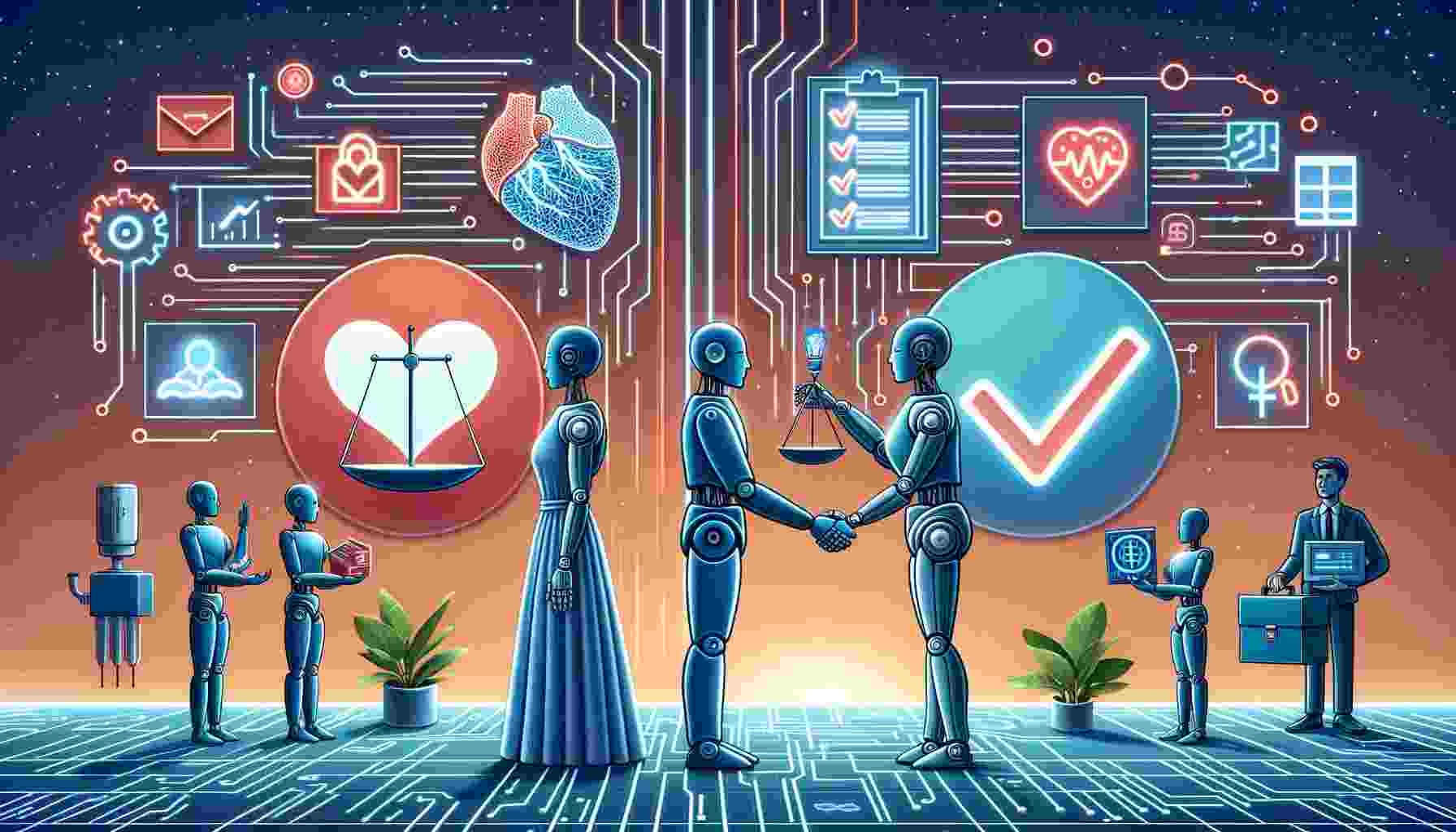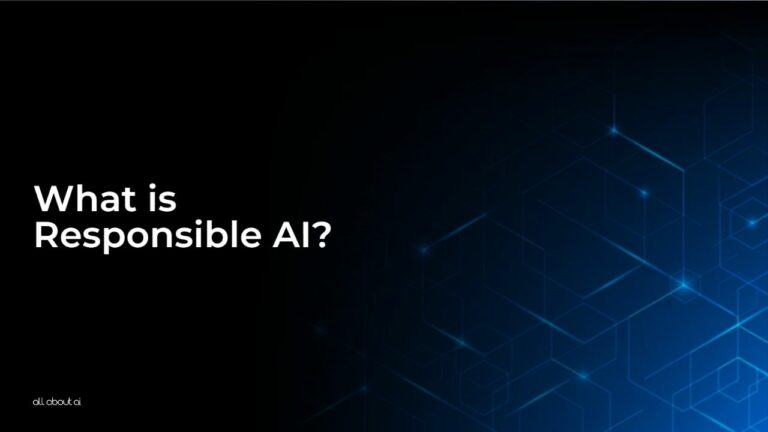Responsible AI is a multifaceted concept in the field of artificial intelligence, focusing on the creation and management of AI systems in a manner that is ethically sound, transparent, and accountable. It involves ensuring that AI technologies are developed and used in ways that are beneficial and do not cause unintended harm.
Looking to learn more about responsible AI? Read this article written by the AI specialists at All About AI.
What is Responsible AI? : Robots with Good Vibes Only!
Responsible AI is like making sure that smart robots and computer programs are made and used in a really good and fair way. It’s important to make these smart systems in a way that is right, clear to everyone, and where people can check if everything is okay. This means we need to make sure these smart robots and programs do helpful things and don’t accidentally do anything bad.
Why Is Responsible AI Important?

The importance of Responsible AI lies in its ability to mitigate risks associated with AI technologies. It addresses ethical concerns, reduces biases, ensures fairness, and promotes transparency, making AI systems more reliable and trustworthy.
Here’s why responsible AI is so important as we move forward with this tech.
Mitigating Risks and Biases:
Responsible artificial intelligence plays a pivotal role in identifying and mitigating risks and biases in AI systems. By focusing on fairness and diversity, it prevents discriminatory practices and promotes inclusivity, ensuring that AI technologies serve diverse populations effectively and equitably.
Building Trust in AI Technologies:
Trust is fundamental for the widespread adoption of AI. Responsible AI fosters trust among users and stakeholders by ensuring transparency and accountability in AI operations. This trust is essential for the successful integration of AI into various sectors of society.
Ensuring Legal and Ethical Compliance:
As AI technologies become more prevalent, the need for legal and ethical compliance intensifies. Responsible AI ensures that AI systems adhere to evolving laws and ethical standards, helping organizations avoid legal repercussions and maintain ethical integrity.
Enhancing Public Safety and Security:
AI systems can pose safety and security risks if not managed responsibly. Responsible AI prioritizes the safety and security of the public by ensuring that AI technologies are reliable and do not inadvertently cause harm to individuals or communities.
Promoting Sustainable Development:
Responsible AI contributes to sustainable development by ensuring that AI technologies are used in a way that is beneficial for society and the environment. It encourages the development of AI solutions that address global challenges like climate change and resource management.
Implementing Responsible AI: Best Practices and Challenges
Implementing Responsible AI involves adhering to best practices like ensuring data privacy, reducing biases, and maintaining transparency.
Best Practices
- Ensuring Transparency: Maintaining transparency in AI processes and decision-making is crucial. This involves clear communication about how AI systems work, the data they use, and the rationale behind their decisions.
- Prioritizing Privacy: Protecting user data and ensuring privacy in AI systems is paramount. This involves implementing robust data protection measures and respecting user consent.
- Reducing Biases: Actively working to identify and reduce biases in AI algorithms is essential to ensure fairness and equity. This includes diverse data sets and regular audits of AI systems.
- Encouraging Accountability: Establishing clear lines of accountability for AI systems helps in addressing any negative impacts or failures. Organizations must take responsibility for their AI systems’ actions and decisions.
- Continuous Monitoring and Evaluation: Regularly monitoring and evaluating AI systems ensures they function as intended and adapt to changing environments or requirements.
Challenges include managing the complexity of AI systems, addressing diverse ethical standards, and balancing innovation with responsibility.
Challenges
- Complexity of AI Systems: The complexity of AI systems makes it difficult to fully understand and control their operations, posing a challenge to implementing responsible AI practices.
- Ethical Dilemmas: AI can present ethical dilemmas, such as privacy versus public safety or automation versus employment, requiring careful consideration and balance.
- Technological Limitations: Current technological limitations can restrict the ability to fully realize responsible AI, such as in accurately detecting biases or ensuring complete transparency.
- Evolving Regulations: The rapidly evolving nature of AI technology and its regulation presents a challenge in staying compliant and up-to-date with legal requirements.
- Balancing Innovation and Responsibility: Striking a balance between fostering innovation in AI and ensuring responsible development and use is a significant challenge for organizations.
How Is Responsible AI Different from Ethical AI?
Responsible AI and Ethical AI are closely related but not identical. Here are some differences between the two.

- Scope and Application: Responsible AI encompasses a broader scope than Ethical AI, including legal compliance and societal impact, while Ethical AI focuses primarily on moral and ethical considerations.
- Operational Practices: Responsible AI includes practical implementation aspects, such as transparency and accountability in AI systems, whereas Ethical AI is more concerned with guiding principles and values.
- Regulatory Compliance: Responsible AI involves adhering to legal and regulatory frameworks, whereas Ethical AI is not necessarily bound by law but by moral principles.
- Stakeholder Engagement: Responsible AI often requires a multi-stakeholder approach, considering the interests of various groups, while Ethical AI is centered around aligning AI with human-centric values.
- Risk Management: Responsible AI places a strong emphasis on risk management and mitigation, addressing potential harms, whereas Ethical AI focuses on ensuring ethical behavior in AI development and use.
What Are the Principles of Responsible AI?
The principles of Responsible AI include fairness, transparency, accountability, privacy, and security.
Fairness:
Ensuring AI systems do not perpetuate biases and are equitable in their operations. This involves designing algorithms that treat all groups fairly and make unbiased decisions.
Transparency and Explainability:
AI systems should be transparent, with decisions that are understandable and explainable to users. This principle promotes trust and allows for better assessment and control of AI systems.
Privacy and Security:
Protecting user data and ensuring the security of AI systems are crucial. This involves implementing robust data protection measures and safeguarding against security breaches.
Accountability:
Organizations should be accountable for their AI systems, taking responsibility for their development, deployment, and impacts. This includes establishing clear governance structures and lines of responsibility.
Sustainability:
AI systems should be developed with sustainability in mind, promoting environmental friendliness and long-term viability. This involves using resources efficiently and minimizing negative environmental impacts.
The Future of Responsible AI in Technology
The future of Responsible AI in technology is promising yet challenging. It will involve continuous advancements in AI, coupled with evolving ethical standards and regulatory frameworks.

- Advancements in Explainable AI: Future AI systems will likely see significant advancements in explainability, allowing users to understand and trust AI decisions better, enhancing transparency and accountability.
- Enhanced Regulatory Frameworks: We can expect more comprehensive and globally aligned regulatory frameworks for AI, ensuring responsible development and use across different regions and industries.
- Integration of Ethical Considerations in AI Design: Ethical considerations will increasingly be integrated into the design phase of AI systems, ensuring that ethical principles are embedded from the outset.
- Increased Focus on AI for Social Good: There will be a growing emphasis on using AI to address social and environmental challenges, aligning AI innovations with global sustainable development goals.
- Collaborative Efforts Across Sectors: The future will likely see enhanced collaboration between governments, private sectors, and civil society in developing and implementing responsible AI, fostering a multi-stakeholder approach.
Want to Read More? Explore These AI Glossaries!
Begin your exploration of AI learning through our comprehensive glossaries, designed for AI novices and experienced learners alike. View this as your essential aid in enhancing your understanding of AI and discovering new AI concepts.
- What is Activation Function?: An activation function, in the context of AI, is a mathematical operation applied to the output of each node in a neural network.
- What is Adaptive Algorithm?: In the world of Artificial Intelligence (AI), an adaptive algorithm is a computational tool designed to adjust its behavior in response to changing input data or environmental conditions.
- What is Adaptive Neuro Fuzzy Inference System?: Adaptive Neuro Fuzzy Inference System (ANFIS) is a pioneering AI model seamlessly merging fuzzy logic and neural networks.
- What is Admissible Heuristic?: An admissible heuristic plays a critical role in guiding artificial intelligence decision-making processes.
- What is Affective Computing?: At its core, Affective Computing aims to imbue machines with emotional intelligence, allowing them to perceive and respond to human emotions in a nuanced manner.
FAQs
What does responsible AI mean?
What is the difference between AI and responsible AI?
Why is responsible AI needed?
What is trustworthy AI and responsible AI?
Is ethical AI the same as responsible AI?
Wrap Up
Responsible AI is a critical concept in AI, ensuring that AI technologies are developed and used in ways that are beneficial to society. By adhering to the principles of Responsible AI, we can look forward to a future where AI technologies are not only advanced but also aligned with our ethical standards and societal values.
This article comprehensively answered the question, “what is responsible AI.” If you’re looking to learn more about the field of artificial intelligence, check out the articles we have in our AI Key Terms Index.





